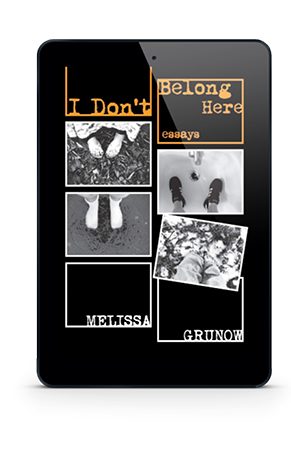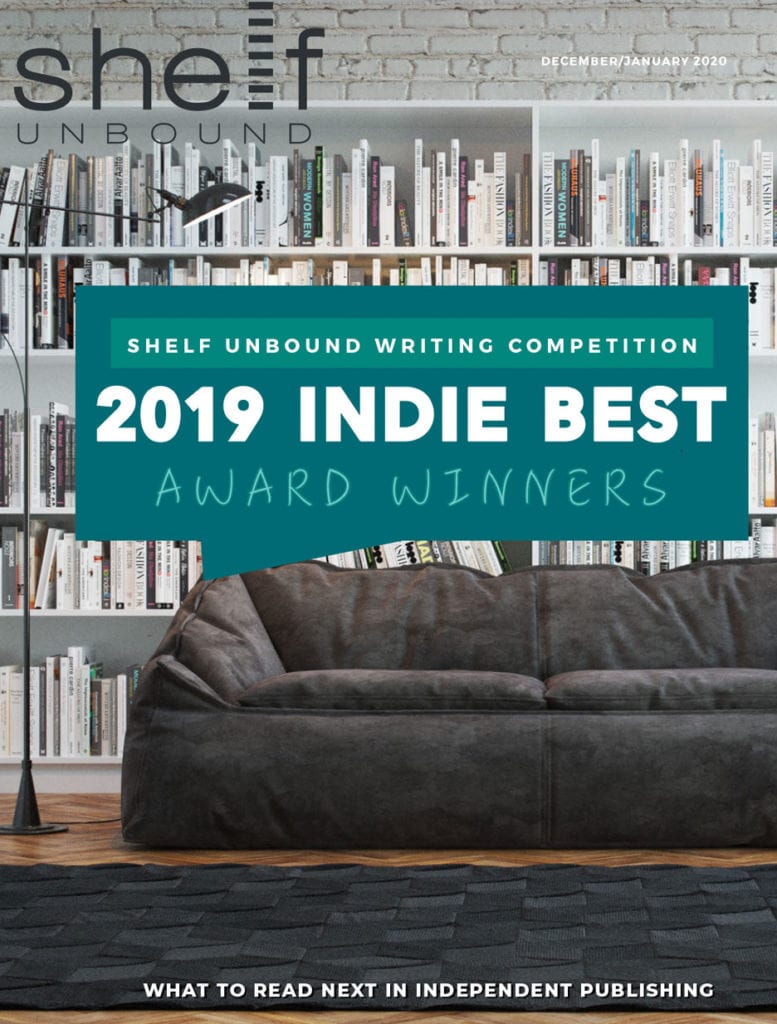Shelf Media hosts the annual Shelf Unbound Best Indie Book Competition for best self-published or independently published book. In addition to prizes, the winner, finalists, long-listed, and more than 100 notable books from the competition are featured in the December/January issue of Shelf Unbound.

What does it mean to belong? In a place? With a person? To a family? Where do our senses of security and survival lie? I Don’t Belong Here ruthlessly investigates alienation during moments of transit and dislocation and their impact on women’s identity. These twenty essays—ranging from conventional to lyrical to experimental in form and structure—delve into the root causes of personal uncertainty and the aftershock effects of being a woman in an unsafe world. Provocative, authentic, intimate, and uncompromising, Melissa Grunow casts light on the unspeakable: sexuality, death, mental illness, trauma, estrangement, and disillusionment with precision and fortitude.
Shelf Media hosts the annual Shelf Unbound Best Indie Book Competition for best self-published or independently published book. In addition to prizes, the winner, finalists, long-listed, and more than 100 notable books from the competition are featured in the December/January issue of Shelf Unbound.
About The Author: Melissa Grunow
Melissa Grunow is the author of I DON’T BELONG HERE: ESSAYS (New Meridian Arts Press, 2018) and REALIZING RIVER CITY: A MEMOIR (Tumbleweed Books, 2016) which won the 2018 Book Excellence Award in Memoir, the 2017 Silver Medal in Nonfiction-Memoir from Readers’ Favorite International Book Contest, and Second Place-Nonfiction in the 2016 Independent Author Network Book of the Year Awards.
Interview with Melissa Grunow.
Tell us about your book.
MG: I Don’t Belong Here is a collection of essays that explores the various concepts of what it means to belong, or in many cases, to not belong. Belonging can be anything from finding that physical or metaphorical space we call “home,” or figuring out who we are by experiencing who we don’t want to be. Our identities are formed and maintained by our sense of belonging to different groups—from family and relationships to geography to gender and even to socioeconomic class—so what happens when those systems break down? How is our identity impacted by transit and dislocation?
Personally, I’ve felt more like an observer most of my life, rather than as an active participant in it. While a number of writers feel this way (as our observational skills are part of what makes us writers), I have not read anything that really investigates it. I Don’t Belong Here uses often taboo topics in contemporary American culture, such as abuse, death, mental illness, trauma, isolation, and estrangement, as the catalysts for the exploration within each of the essays. To me, the writing in this book is more of an invitation to a conversation than it is attempting to make any kind of solid argument. It’s an exploration of my lived experiences within the forbidden, one where I invite the reader along on the journey.
How did you go about developing the book?
MG: I had chosen the title for I Don’t Belong Here early on in the project because it was exactly how I was feeling about each essay I wrote. What I mean is, I was starting to realize how my writing felt like an immersion in the distant persona. I spend so much time with other people feeling like I was only existing inside my head; I was observing what was happening around me and pushing the spotlight onto others, rather than living as if I am in the starring role of my own life. So, to answer your question more directly, the idea came first and the majority of the essays in the collection followed suit.
Creative nonfiction is a wonderfully adaptive genre because an essay can take so many forms and address endless topics and issues, and the writer doesn’t have to have all of the answers. I’m most compelled to write a new piece when I’m trying to make sense of something or someone, even if that someone is myself. I let these essays take over. Even if I set out with one intention, often he piece would deviate in form or subject by the time I was done with the first draft. That’s always been my process, though. When it comes to writing, for me, the work comes along when it’s ready. I very rarely have any control over it.
What was the experience of writing this book like for you?
MG: Writing this book gutted me. It was an emotional and mental endurance marathon because I was committed to diving deep into the subject every time I sat down to write. Oftentimes that meant unveiling some ugly truths about myself, whether it be a person I once was or the person I believed myself to be. I forced myself to be as raw and truthful in every essay because authenticity was essential to unveiling and investigating the themes in the book. I had to just off the naysaying part of my brain that warned me how people might react or respond to some of the essays. If I listened to those internal criticisms, I wouldn’t have written a thing. I told myself the book would never get published anyway, so why not be as real and dark as necessary? During revision (and I am an extensive reviser), I was more cautious about what I said or how I said it. I didn’t censor myself, but I did think critically about purpose and audience.
What writing advice do you have for other indie authors?
MG: Writing is work and to be a writer, you need to do the work. In the age of social media, it can be intimidating when we see the success of other writers, but what we often don’t see is their process and their struggles. It is a process, and you are going to struggle. Share your drafts with others and welcome their feedback, but don’t allow for that feedback to override your purpose. Join a writing group or take a class. Be a thoughtful literary citizen and remember that while writing is a solitary act, writers are part of a community, and we need to support one another. Show your support for your writing friends’ successes by going to their readings, buying their books, sharing their work on social media, leaving a review on Goodreads, and requesting that your library stock their books. Read. Read books in your genre and outside of your genre. You cannot be a writer if you don’t read. Read some more. Study the prose like a writer, but do not try to emulate it. Find your own voice among the chorus of voices that are out there. Throughout all of it, keep writing, but don’t chastise yourself if you need to take a break from the work. It will be there when you’re ready to return to it.
What are you working on next?
MG: I’m nearly finished with a rough draft of a true crime memoir, so that’s my primary project right now. I am also working on a collection of speculative nonfiction essays as well as a collection of short stories that are surreal, reality-bending, and maybe even a little weird.
READ AN EXCERPT
DWELLING PLACE
“One never reaches home, but wherever friendly paths intersect the whole world looks like home for a time.”
– Hermann Hesse, Demian
“Do you smell that?” I asked.
Dave closed the door against the cold November night air behind him. He studied the yellow walls and textured ceiling of the living room, scanned over the cobwebs in the corners, the stains on the flattened carpeting. “Smell what?” he asked.
I inhaled again. It was subtle but evident. I wandered into the kitchen while taking giant breaths in through my nose until I was dizzy. I tossed the house key onto the counter and listened to it clang and then settle onto the outdated teal Formica. I would have to add it to my key ring later.
“I don’t smell anything,” Dave said, though he never did. Five years of heavy smoking at the poker table in the Las Vegas Palms Casino before moving back to Michigan had made sure of that.
A cheap, gel air freshener from a dollar store sat dried up on the counter. Once the smell of strawberries, it could no longer cover the distinctive odor of water damage, mildew, rot.
I hadn’t noticed the odor while house hunting or during the home inspection. But I couldn’t deny it now. It was all around us, like a damp dungeon slowly closing in.
Dave set the envelope of signed mortgage papers on the stove. I imagined clicking on the gas burner and watching them catch fire, my signature on the bottom of each page turning to ash and floating away, absolving me of any responsibility for something I wasn’t sure I was ready to handle.
Maybe, I hoped. Maybe what the house just needs is a good cleaning. Maybe, what I knew was a serious something, would turn out to be a simple nothing.

Continue Reading…
Article originally Published in the December/January 2020 Issue “2019 Indie Best Award Winners”
